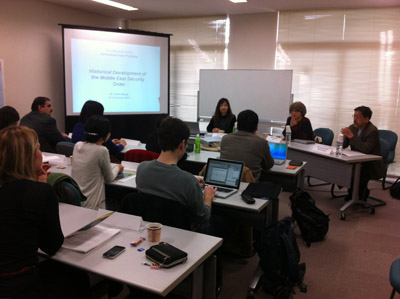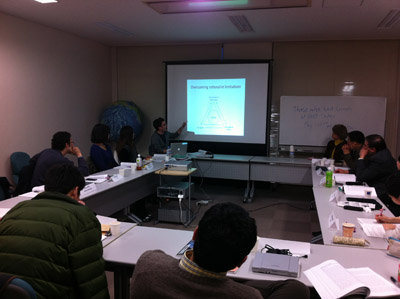
-
KIAS/G-COE「生存基盤持続型の発展を目指す地域研究拠点」イニシアティブ1/TUFS科研基盤(A)「現代中東・アジア地域における紛争・国家破綻と社会運動」/TUFS-ATPIC共催
国際WS
(2012年2月22-23日 於東京外国語大学)
タイトル:"Transcending borders: networks, values and identities In the Middle East and Muslim societies"
Date: 22 and 23 February, 2012
Venue: Kenkyu-kougi-tou (Research and Lecture Building) Rm. 406, Tokyo University of Foreign Studies (3-11-1, Asahi-cho, Fuchu-shi, Tokyo)
Organized and Sponsored by:
"Conflict, Collapsed State and Social Movements in the Contemporary Asia and Middle East"
Grants-in-Aid for Scientific Research, Japan Society for Promotion of Science (Coordinator: Keiko SAKAI)
"Global COE Program: "In Search of Sustainable Humanosphere in Asia and Africa"Center for Islamic Area Studies at Kyoto University (KIAS)
(Coordinator: Yasushi KOSUGI)
Program:
Day 1 (22 Feb[Wed])
11:00-11:10 Opening remarks: Prof. Keiko SAKAI (TUFS)
11:10-12:30 Keynote lecture: Historical development of Middle East International Relations (Yukiko MIYAGI: Lecturer, School of Government and International Affairs, University of Durham, UK)
12:30-13:30 Lunch
13:30-15:45
Shizuka IMAI (Kyoto University): The Political Economy of Trade Development: The Jordanian Experience in the 1990s
Yushi CHIBA (Kyoto University): Jordan Media City in Contemporary Arab Broadcasting Scene: Achievements and Prospects
Khalil DAHBI (TUFS): Usage of the Internet by Social Movements in Authoritarian settings: The Case of the emergence of the "20th February Movement" in Morocco
16:00-18:15
Makiko NAMBU (TUFS): Contentious Politics in Palestinian Resistance Movement:the Case of al-Aqsa Intifada 2000 - 2006
Patrick MASON (TUFS): Fighting in the Network - Social networks, insurgency and development in Afghanistan
Ladislav LESNIKOVSKI (TUFS): A Survey Design on the Identity Issues among the Slavic Muslim Minorities in Macedonia
Day 2 (23 Feb[Thu])
10:00-12:15
Nicolas BALLESTEROS (TUFS): International Organizations: Power and Pathologies. The case of Human Rights in Kosovo
Marie SATO (Kyoto University):What produce Refugees in the Contemporary Middle East? : A review of the Case of Jordan as a Major Host Country
Ahmed Amir ISMAIL (TUFS): Why the popular uprising in Iraq has failed in achieving its goals?
12:15-13:15 Lunch
13:20-15:20
Film "Open Shutters" (by Maysoon Pachachi, on Iraqi refugees)
15:30-17:00
Ai KAWAMURA (Kyoto University): Mixed Legal Systems for Islamic Banking: Comparing the Banking Regulations of the United Arab Emirates and Malaysia
Maja VODOPIVEC (TUFS): On Possibility of the Japanese Postwar Thought - Takeuchi Yoshimi's View of Islam - Its Continuities and Discontinuities
17:00-17:10 Closing Remarks (Prof. Yasushi KOSUGI )


The two-day international joint workshop titled "Transcending borders" was held with wide topics presentations and discussions from various nationalities' attendants at TUFS. We had professor Miyagi from School of Government and International Affairs, University of Durham (UK) as a guest who gave keynote lecture about Middle East International Relations in the first day. She pointed out phase1 to 7 watching through historical development in the region and its relationship with international society.
The first session was targeted Jordan and Morocco through trade and media with 3 presentations. The presentation about trade development of Jordan pointed out the tremendous changes in 90s which Jordan faced and its reflection to its trade to international relations, which Jordan had to seek new partners in its trade and its relationship with Israel as a best ally. The second presentation was about Jordan's Media city with its achievements and prospects. Its role and of independence from the government was discussed with floor. The last presentation was about usage of the Internet in Morocco at the "20th February Movement", one of the waves of protests associated so-called "Arab Spring". The power the Internet has was clearly mentioned with the term "digital public sphere" the presenter called.
The second session was targeted Palestine, Afghanistan and Macedonia where experienced or has experienced long lasting vulnerability. The first one looked at Intifada happened in Palestine in 2000 and 2006. Those two Intifada's characters and comparable points were questioned. The next one tackled insurgencies that Afghanistan has facing by using rational-network approach. It claims that rational choice theory does not provide contingent or contextual explanations seen in the decision making process. The last one was about the Slavic Muslim minorities in Macedonia considered their identity issue. After the conflicts and ensuing political changes in the region the region has faced numbers of various difficulties for the minorities. The questions for the field work in this spring break that the presenter made was discussed. At the same time the difficulties to define or to be recognized were pointed out.

In the second day, the first session was held with topics targeted Kosovo, Jordan and Iraq. The first one was the human rights issue in Kosovo concerning international organizations' behavior and the impact they have in the different scenarios. The second one was refugee issue in the Middle East considering from ecological aspects. The features of climate and geography it has is the one factor of producing refugees, however, there were comments on conflicts which is the main factor for them. The last one was the popular uprising in Iraq through the last year. The peacefulness of the uprising was pointed and awareness of people on the current political situations was proved by the events the presenter concluded. The recent situation and the atmosphere in Iraq were questioned.
The first afternoon session we had showed a documentary film about Iraqi women learning to tell stories using photography. The director herself is Iraqi raised up in UK. The life stories of the women were presented by following the training session they participated and photos they took. Each of their stories was deep and tossed about by Iraq's stability.
The last session of the two-day workshop was about legal systems for Islamic banking which compared banking regulations of the UAE and Malaysia and about a Japanese scholar's, Takeuchi Yoshimi, view of Islam. To the first one, aim of the comparison was questioned. At the same time the government supports to the Islamic banking in Malaysia was pointed to be considered. The two-day workshop was fruitful in wide fields of theme with various nationalities participated.
報告者:佐藤 麻理絵(京都大学大学院アジア・アフリカ地域研究研究科)


















